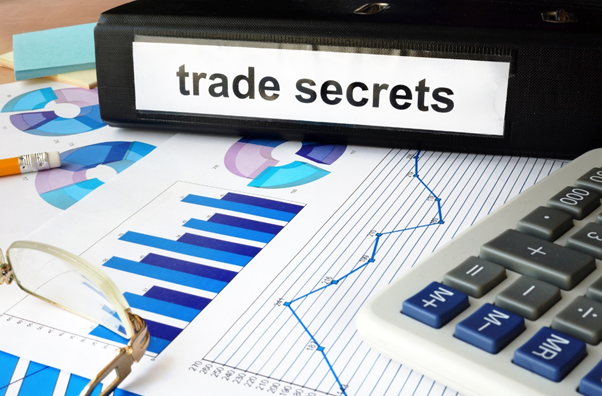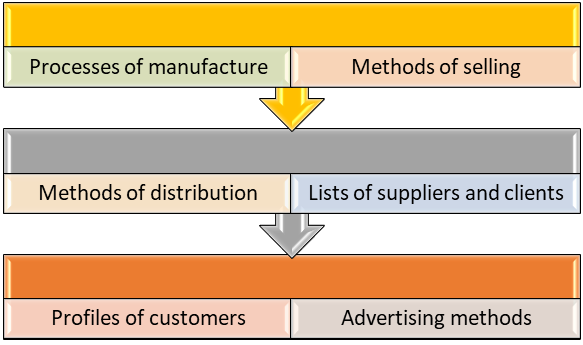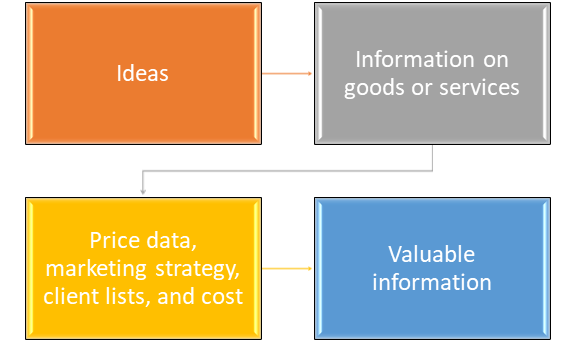Definition
Related Definitions
Trade secrets
What is a trade secret?
A trade secret is a corporate technique or practice that is not widely known outside of the organisation. Trade secrets are frequently the result of internal research and development and provide a competitive edge. Trade secrets are a type of intellectual property owned by a firm, and unlike a patent, they are not publicly disclosed.
The three factors required for trade secrets are listed below; if any of these elements is missing, the trade secret will be lost. Or else, there is just no limit to how long a trade secret can be protected.
- A trade secret is a piece of information that might have potential or genuine independent economic value since it is not widely known.
- Others who are unable to acquire the material legally should find it helpful.
- It must make reasonable steps to keep its confidentiality.
Highlights
- Secret methods and practices that offer a corporation a competitive advantage over its competitors are trade secrets.
- Trade secrets vary by jurisdiction, but they all share three characteristics: they provide some economic advantage, are not public, and are actively protected.
- Trade secrets have a high commercial value since they are kept hidden from competitors.
Frequently Asked Questions (FAQs)
What does the term "trade secret" mean?

Source: © Designer491 | Megapixl.com
A trade secret is any sensitive commercial information that aids an organisation's competitive advantage. They're frequently employed when innovation isn't patentable or when the investor doesn't want to publicly reveal the "secret" as a patent requires for that.
As trade secrets are kept hidden from competitors, they have a high commercial value. Therefore, the possessor of a trade secret should actively take steps to keep the information hidden.
The following are examples of common trade secrets:

Source: Copyright © 2021 Kalkine Media
However, unauthorised use of trade secret information by someone who is not the proprietor, on the other hand, is a trade secret infringement. The information that qualifies as a trade secret varies depending on the situation. Commercial or industrial espionage, breach of confidence, and contract are examples of unfair activities involving secret information.
A trade secret can be a private technique, pattern, instrument, formula, design, method, recipe, or practice that is not obvious to others and is utilised to establish an enterprise that delivers value to customers or gives a competitive edge to competitors.
Trade secrets are the "classified documents" of the corporate world. A company may require employees to have access to trade secrets to sign non-compete or non-disclosure agreements (NDA) when they are hired to protect its trade secrets.
For example, many well-known trade secrets exist, such as Google's search algorithm, which exists as intellectual property in code and is changed regularly to safeguard and improve its operations.

What kinds of information can trade secrets safeguard?
Trademarks, patents, and copyright are examples of intellectual property rights. But, on the other hand, trade secrets are an incredibly beneficial kind of protection frequently used to safeguard sensitive or important technological information.
Here are some examples of what trade secrets can safeguard:
- Ideas give a company a competitive advantage, anything as simple as a marketing strategy or new product concept.
- Competitors' awareness of goods or service in production and its functional or technical features, such as the inner workings of a new software programme.
- Price data, marketing strategy, client lists, and cost are critical corporate data that must be safeguarded.
- Almost any other piece of information with any worth that competitors don't know widely. For example, this might include a list of customers rated by their company's profitability.
What are the rights granted by trade secrets?
A trade secret holder can prohibit the following individuals from using, copying, or benefitting from its trade secrets, as well as revealing them to others without consent:
- People who are immediately bound by a duty of secrecy not to use or divulge trade secret information, such as any worker who makes contact with the employer's trade secrets regularly as part of their job. This could include a member of a company's leadership team or a board of directors.
- Individuals who obtain a trade secret using unethical methods such as bribery, industrial espionage, or theft.
- People who find a trade secret by accident or mistake but have cause to believe that the information is a protected trade secret.
How does a company safeguard its trade secrets?
Simply declaring something a "trade secret" isn't enough. A company must affirmatively act in a way that demonstrates its willingness to keep information secret, which means taking procedures to ensure secrecy, and some corporations go to great efforts to do so.
The Coca-Cola formula, possibly the world's most renowned trade secret, is stored in a bank vault that can only be unlocked by a Coca-Cola Company board of directors’ resolution. Only two Coca-Cola employees have access to the recipe at any given time; their identities are never exposed to the public, and they aren't even allowed to fly together.
However, extreme steps to preserve trade secrets are rarely required. Documents holding trade secrets should be marked "confidential," and trade secret materials should be locked away after business hours. Secret information should only be shared with persons with a reasonable need to know, and computer security should be maintained. These measures would demonstrate to a court that you wish to keep your information private.
Non-disclosure agreements are the most popular and successful technique to protect trade secrets. Courts have repeatedly stated that non-disclosure agreements are the essential method for keeping hidden information private.

Source: © Cammeraydave | Megapixl.com
How can a company stand up to wrongdoing?
Every state prohibits disclosure of trade secrets or the theft of information. By requesting a court to issue an order prohibiting future revelation or use of the secrets, a trade secret possessor can enforce his or her rights against someone who steals sensitive information. A trade secret proprietor can also seek damages for any economic loss incurred due to the use of the trade secret and unlawful acquisition.
A trade secret holder must establish that the information claimed to be confidential gives a competitive advantage, and the information is kept secret to win a trade secret infringement lawsuit.
